The Metropolitan Transit Authority of Harris County (METRO) is a major public transportation agency based in Houston, Texas, United States. It operates bus, light rail, bus rapid transit, HOV and HOT lanes, and paratransit service in the city as well as most of Harris County. It also operates bus service to two cities in Fort Bend County, and to Conroe in Montgomery County. The Metro headquarters are in the Lee P. Brown Administration Building in Downtown Houston. In 2023, the system had a ridership of 77,189,800, or about 240,200 per weekday as of the first quarter of 2024.

METRORail is the 22.7-mile (36.5 km) light rail system in Houston, Texas. In 2023, the system had a ridership of 13,883,700, or about 43,200 per weekday as of the first quarter of 2024. METRORail ranks as the second most-traveled light rail system in the Southern United States and the 10th most-traveled light rail system in the United States, and has the highest ridership per mile for light rail systems in the Southern US. METRORail is operated by the Metropolitan Transit Authority of Harris County (METRO).
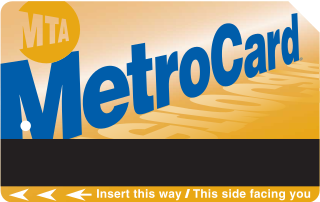
The MetroCard is a magnetic stripe card used for fare payment on transportation in the New York City area. It is a payment method for the New York City Subway, New York City Transit buses and MTA buses. The MetroCard is also accepted by several partner agencies: Nassau Inter-County Express (NICE), the PATH train system, the Roosevelt Island Tramway, AirTrain JFK, and Westchester County's Bee-Line Bus System.

Miami-Dade Transit (MDT) is the primary public transit authority of Miami, Florida and the greater Miami-Dade County area. It is the largest transit system in Florida and the 15th-largest transit system in the United States. As of 2023, the system has 80,168,700 rides per year, or about 279,400 per weekday in the first quarter of 2024. MDT operates the Metrobus with their paratransit STS systems run by LSF. MDT also operates two rail transit systems: Metrorail and Metromover.

SmarTrip is a contactless stored-value smart card payment system managed by the Washington Metropolitan Area Transit Authority (WMATA). The Maryland Transit Administration (MTA) uses a compatible payment system called CharmCard. A reciprocity agreement between the MTA and WMATA allows either card to be used for travel on any of the participating transit systems in the Baltimore-Washington metropolitan area. Unlike traditional paper farecards or bus passes, SmarTrip/CharmCard is designed to be permanent and reloadable; the term "SmarTrip" may refer to both payment systems unless otherwise noted.
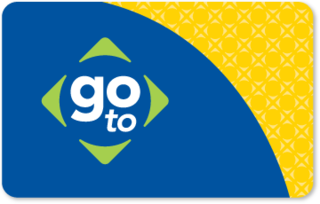
The Go-To card is a contactless smart card used to pay fares for bus, light rail, and commuter rail lines operated by Metro Transit and other transit agencies in the Twin Cities area of Minnesota. The system has significantly sped up boardings on area buses while alleviating wear and tear on existing ticket machines and fare boxes. The old magnetic strip reading machines were weather sensitive and could not be placed out in the elements like at the Hiawatha Line light rail stations.

The EasyCard is a contactless smartcard system operated by the EasyCard Corporation, which was previously named the "Taipei Smart Card Corporation", for payment on the Taipei Metro, buses, and other public transport services in Taipei since June 2002, and its usage has since expanded to multiple kinds of businesses. Its use has also since been expanded to include convenience stores, department stores, supermarkets, taxis, and other retailers since 1 April 2010. Like conventional electronic fare systems, the card employs RFID technology to operate without physical contact. They are available for purchase at all Metro stations and all chain convenience stores.
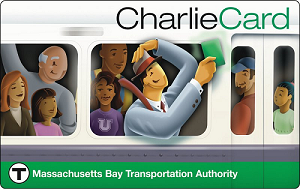
The CharlieCard is a contactless smart card used for fare payment for transportation in the Boston area. It is the primary payment method for the Massachusetts Bay Transportation Authority (MBTA) and several regional public transport systems in the U.S. state of Massachusetts. It is used on the MBTA's subway and bus services, but is not currently accepted on the MBTA Commuter Rail and ferries.
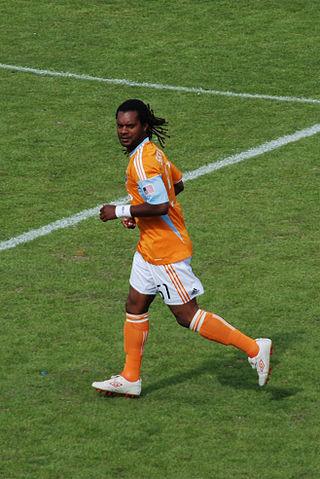
Adrian Serioux is a Canadian retired professional soccer player who played as a defender.

The Shanghai Public Transportation Card (SPTC) is a contactless card, utilizing RFID technology, which can be used to access many forms of public transport and related services in and around Shanghai. Shanghai public transportation card is also provided in the form of Apple Pay as well as QR codes, which is accessible through WeChat, Alipay, APPs and miniprograms, and enjoy same price discounts as cards.

The ORCA card is a contactless, stored-value smart card system for public transit in the Puget Sound region of Washington, United States. The card is valid on most transit systems in the Seattle metropolitan area, including Sound Transit, local bus agencies, Washington State Ferries, the King County Water Taxi, and Kitsap Fast Ferries. It was launched in 2009 and is managed by the Central Puget Sound Regional Fare Coordination Project, a board composed of local transit agencies.

A transit pass or travel card, often referred to as a bus pass or train pass etc., is a ticket that allows a passenger of the service to take either a certain number of pre-purchased trips or unlimited trips within a fixed period of time.

Loudoun County Transit is a public-transportation service provided by the Loudoun County, Virginia government. Loudoun County Transit provides fixed routes and on-demand/paratransit bus service.
The Green Line is a 3.3 mi (5.3 km) METRORail light rail/streetcar line operated by METRO in Houston, Texas, serving the East End area. The first seven-station segment of this line opened on May 23, 2015. The two-station eastern end of this route was delayed due to issues over crossing Union Pacific Railroad tracks, but eventually opened in January 2017.
Integrated ticketing allows a person to make a journey that involves transfers within or between different transport modes with a single ticket that is valid for the complete journey, modes being buses, trains, subways, ferries, etc. The purpose of integrated ticketing is to encourage people to use public transport by simplifying switching between transport modes and by increasing the efficiency of the services.
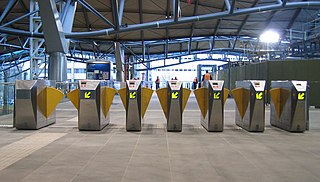
An automated fare collection (AFC) system is the collection of components that automate the ticketing system of a public transportation network – an automated version of manual fare collection. An AFC system is usually the basis for integrated ticketing.

Houston BCycle was a bicycle sharing system, owned and operated by Houston Bike Share, a non-profit organization that administers bike sharing for the City of Houston. There were over 150 stations located within the city limits, and over 1300 bicycles. Since June 30, 2024, the ride-sharing program has been discontinued.

Briarhills is a subdivision in western Houston, Texas. The Briarhills Property Owners Association (POA) and the Briarhills Home Owners Association (HOA) serve Briarhills, Meadowbriar, and Oaks of Parkway.
OMNY is a contactless fare payment system, currently being implemented for use on public transit in the New York metropolitan area. OMNY can currently be used to pay fares at all New York City Subway and Staten Island Railway stations, on all MTA buses, AirTrain JFK, Metro North's Hudson Rail Link, and on the Roosevelt Island Tram; when completely rolled out, it will also replace the MetroCard on Bee-Line buses, and NICE buses. OMNY will also expand beyond the current scope of the MetroCard to include the Long Island Rail Road and Metro-North Railroad.

This article lists the openings of lines, line segments, stations and fare schemes of the Shanghai Metro, a rapid transit system serving Shanghai, China, and one of the fastest-growing metro systems in the world. The first section opened in 1993, and the system currently has 802 kilometres (498 mi) of track in operation, making it one of the world's largest rapid transit systems by route length and second largest by number of stations.
















